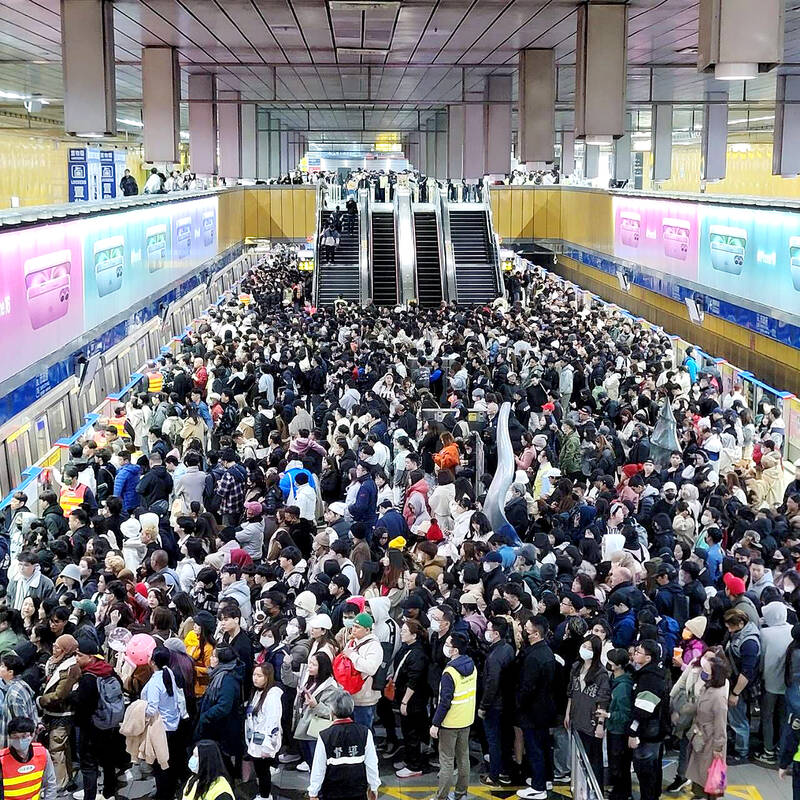Taipei city councilors yesterday raised questions about Taipei Rapid Transit Corp’s (TRTC) handling of lost goods, suggesting that the company review and change its methods.
The company takes custody of lost funds or items and informs the owner without turning it over to the police, Taipei City Councilor Hung Chien-yi (洪健益) said.
If the person who lost the goods or money on the MRT does not claim it, the funds would become part of TRTC income, Hung said.

Photo courtesy of Taipei Rapid Transportation Corp
The estimated value of lost-and-found goods and cash that were not retrieved at the TRTC per year is about NT$7 million (US$212,656), he added.
TRTC is not part of the judiciary and its methods of handling lost money could easily lead to controversy, Hung said, citing an instance during which a passenger left a backpack containing NT$1.5 million in cash on the MRT and retrieved it from the lost and found.
Taipei City Councilor Hsu Hung-ting (徐弘庭) also asked why TRTC did not put the lost-and-found goods up for auction, which is what Taiwan Railway Corp and Kaohsiung Rapid Transit Corp does.
TRTC said the Mass Rapid Transit Act (大眾捷運法) refers to the Civil Code, particularly articles 804 and 807, for the disposition of all lost and found goods on MRTs.
Article 804 of the Civil Code says if the person entitled to the lost property does not identify and claim it within a reasonable time after notification, in accordance with the second paragraph of the preceding article, the person who picks up the lost property must deposit the property with the police or the local autonomous institution.
Meanwhile, Article 807 reads: “If the person who picks up the lost property does not claim such property within three months from the date of informing or advertisement in accordance with the preceding paragraph, the lost property or the net proceeds of its sale belongs to the local autonomous institution.”
Given the large amount of lost items, the Taipei City Government commissioned TRTC to handle all such affairs, per the Administrative Procedure Act (行政程序法), the TRTC said.
TRTC also said it registered 28,000 lost-and-found items, including cash, in 2023, and that it had sent out 1,600 text messages to the owners, 1,000 of whom had come in to retrieve their lost goods.
It had attempted to auction off the more valuable unclaimed lost goods in its inventory in 2014, but this increased expenses due to personnel costs and appraisal fees, TRTC added.
The additional work put into answering the public’s questions regarding the auctioned goods also affected the company’s daily affairs, so it decided to adhere to the Government Procurement Act (政府採購法) and put all items up as a procurement bid, instead of holding an auction, TRTC said.
The most significant amount of cash found on the MRT within the past three years was NT$1.94 million, it said, adding that the owner had been informed and had come to retrieve the money.

Japanese footwear brand Onitsuka Tiger today issued a public apology and said it has suspended an employee amid allegations that the staff member discriminated against a Vietnamese customer at its Taipei 101 store. Posting on the social media platform Threads yesterday, a user said that an employee at the store said that “those shoes are very expensive” when her friend, who is a migrant worker from Vietnam, asked for assistance. The employee then ignored her until she asked again, to which she replied: "We don't have a size 37." The post had amassed nearly 26,000 likes and 916 comments as of this

US President Donald Trump said "it’s up to" Chinese President Xi Jinping (習近平) what China does on Taiwan, but that he would be "very unhappy" with a change in the "status quo," the New York Times said in an interview published yesterday. Xi "considers it to be a part of China, and that’s up to him what he’s going to be doing," Trump told the newspaper on Wednesday. "But I’ve expressed to him that I would be very unhappy if he did that, and I don’t think he’ll do that," he added. "I hope he doesn’t do that." Trump made the comments in

Tourism in Kenting fell to a historic low for the second consecutive year last year, impacting hotels and other local businesses that rely on a steady stream of domestic tourists, the latest data showed. A total of 2.139 million tourists visited Kenting last year, down slightly from 2.14 million in 2024, the data showed. The number of tourists who visited the national park on the Hengchun Peninsula peaked in 2015 at 8.37 million people. That number has been below 2.2 million for two years, although there was a spike in October last year due to multiple long weekends. The occupancy rate for hotels

A cold surge advisory was today issued for 18 cities and counties across Taiwan, with temperatures of below 10°C forecast during the day and into tonight, the Central Weather Administration (CWA) said. New Taipei City, Taipei, Taoyuan and Hsinchu, Miaoli and Yilan counties are expected to experience sustained temperatures of 10°C or lower, the CWA said. Temperatures are likely to temporarily drop below 10°C in most other areas, except Taitung, Pingtung, Penghu and Lienchiang (Matsu) counties, CWA data showed. The cold weather is being caused by a strong continental cold air mass, combined with radiative cooling, a process in which heat escapes from